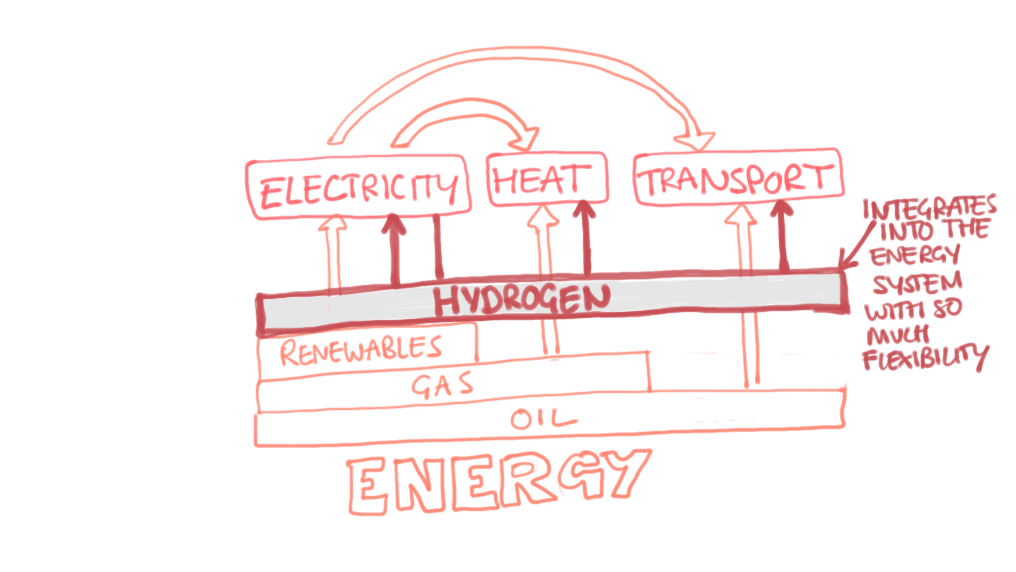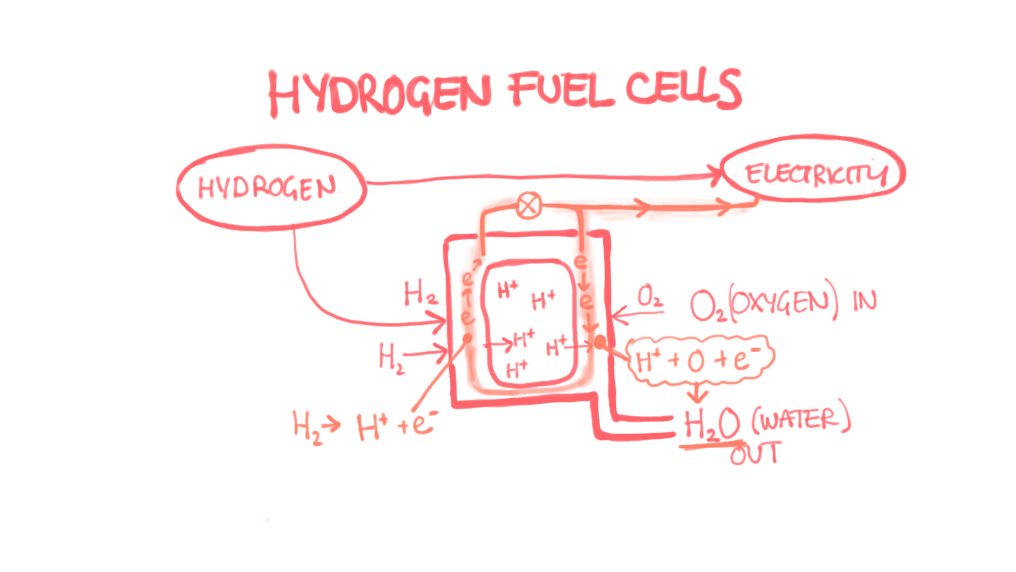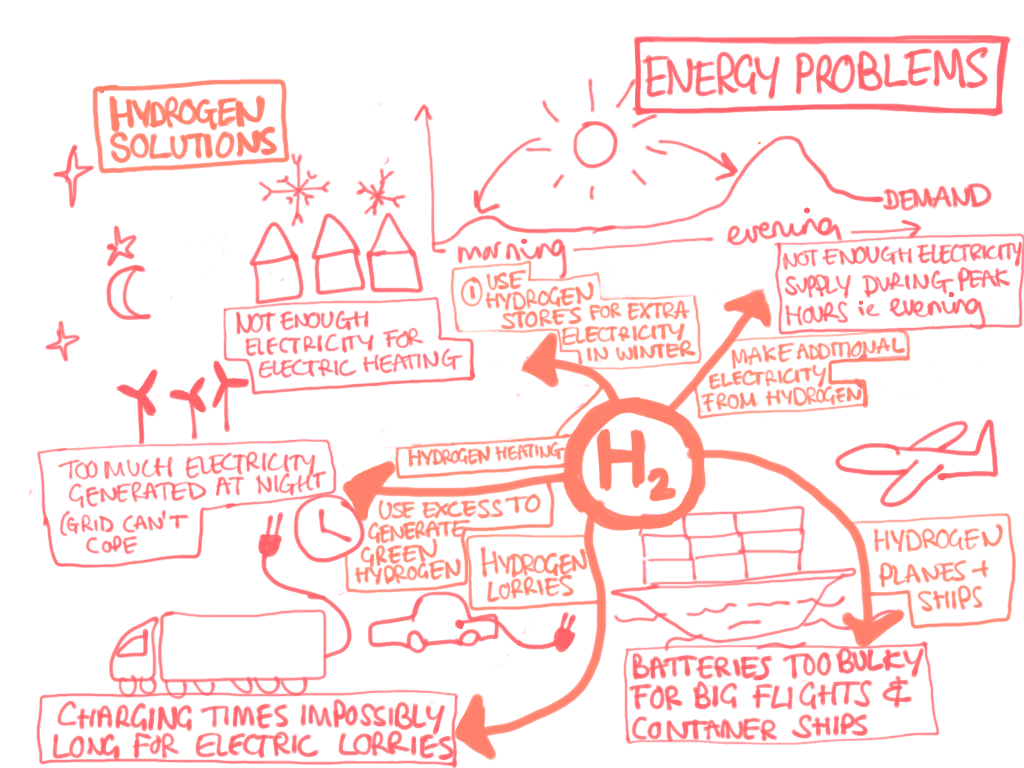We have some big problems seeing the future of how we’re going to generate electricity in the UK (as in a previous post here). We can generate electricity but can’t effectively store it. The electricity can be made without emitting carbon. Some types of transport (like cars) can run off the decarbonised electricity. But there are some types of transport (planes/lorries/ships) that can’t easily run off electricity. There are also some sectors (such as heating in homes) that would add massive demand for electricity if they were to decarbonise. Using hydrogen gas has potential to solve all of these problems in a way that I don’t think there is currently any other technology for [note 1].

Why is this useful?
Think of it like a battery- a battery can charge when there’s free electricity and discharge when you need it. While the battery stores the energy, you can carry it around and take it somewhere with no electricity. You can also buy the battery pre charged if you have no electricity yourself. If you had a solar panel for example you could generate your own electricity, charge the battery and sell the charged battery for profit. Batteries are great because they are so flexible. Hydrogen is a bit like that. It carries potential for use in every stage of the energy flow process AND is useful in itself.
Let’s look at some of the stages:
Making hydrogen-green or blue
You can make hydrogen by splitting water (H2O) into hydrogen and oxygen. There are no nasty by-products in this process. To make the split, you need energy. You could use fossil fuel energy for this, or you could use renewables. At the moment a lot of hydrogen is made using greenhouse gases because it’s still cheaper. It will naturally change as renewables makeup ever increasing amounts of our electricity grid
Using hydrogen- natural gas- combustion engines
Hydrogen could work in 3 ways (no 3 is the coolest!):
Number 1: role of hydrogen as natural gas
Hydrogen has similar properties to natural gas (fossil fuel gas). There is already a huge natural gas infrastructure in the UK with pipelines running everywhere. This same infrastructure could be used to pipe hydrogen into homes. The way we use it would be basically the same as natural gas (but wouldn’t emit carbon dioxide).
Number 2: role of hydrogen as petrol in a car
You could combust hydrogen in vehicles directly instead of petrol or diesel. Engines are optimised for petrol not hydrogen so it wouldn’t be as efficient, but it would work. Doing that would immediately get rid of direct car CO2 emissions. There may also be easy small retrofits that would make it even more possible.
Number 3: role of hydrogen in fuel cell cars
You can use hydrogen to make electricity in something called a fuel cell.

Rather than filling up your car with petrol you could fill it up with hydrogen and then generate the electricity to drive the car motor directly as you drive. This would make filling up so much faster and would mean you had the fuel to run the vehicle much further than you could on the energy stored in a regular sized car battery. It would also be far more scalable to large vehicles, lorries (and possibly even longer distance flights). In this post on the energy trilemma I explained that long charging time makes electrical vehicles (particularly lorrys) inconvenient because the right sort of batter just doesn’t exist. Hydrogen fuel cell vehicles would solve that completely.
Hydrogen to generate electricity – the fuel cells
Using fuel cell technology described above, you could make hydrogen power plants and use hydrogen to generate large amounts of energy on demand. This could plug the gap when renewables are intermittent or when there is a high demand for electricity. For example, if it’s very windy during the night when no-one is using electricity, the power generated from wind turbines will be used to make hydrogen. The next day when there is no wind at 7pm (when everyone needs electricity) you would use hydrogen fuel cells to generate electricity.
Why could it be so useful? What problems is it solving?
This sketch looks at how hydrogen could solve our energy challenges:

Is it dangerous?
Hydrogen is flammable and there have been some hydrogen disasters in the past. Very famous was an explosion a huge airship powered by hydrogen mid-flight.
Since hydrogen is so light (has such low density), when there is a leak, it will escape instantaneously and not be around to cause explosions. This seems to be what more recent research has been showing as they purposefully try to explode cars and study the effects. But of course with any new technologies that haven’t been used for hundreds of years already there are more risks.
Cool application: Extreme E
The extreme E electric racing Raleigh races across the deserts of Saudi Arabia using hydrogen as the electricity source from which they charged up! The charging stations team set up large solar panels a few days in advance to generate electricity. They stored it as hydrogen and then when the cars raced by, they used the hydrogen to generate the electricity for the cars to charge off. It’s a cool case study to look into if you’re interested! (click here)
Conclusion: the potential role of hydrogen
There have been times in history when there has been a big hype for hydrogen but nothing has come them. There were always safety concerns as I touched on above. I think in many cases the hype centred around what hydrogen could offer at low cost but the economics didn’t quite work out. There are different drivers now. Now we NEED alternatives. The path to electric transportation, electric heating and 100% renewables isn’t clear (or at least has many barriers) but we need to decarbonise ugently and hydrogen holds huge potential to enable this. It solves many problems at once I that I can be used to transfer energy into different forms around the systems making up our world.
I think the other possibility fr decarbonised development might be decentralisation of the grid, which is a field related to what I am currently doing my PhD in. This would mean, for example, rather than centrally generating all electricity for the UK and distributing it to the households, each city or town or suburb would have its own renewable ways of generating, it’s own storage and it’s own infrastructure with opportunity to share if one system went down. But to me, it seems like a much bigger technological jump for a country who infrastructure for a centralised network is so well established. It also doesn’t solve the problem of long distance transportation. Potential in decentralised grids could be worth a separate post though. Let me know if there’s interest.
Thanks for reading about the potential role of hydrogen in our futures! please sign up to the mailing list to keep up with all our content! New posts every Tuesday. See you back here soon!

